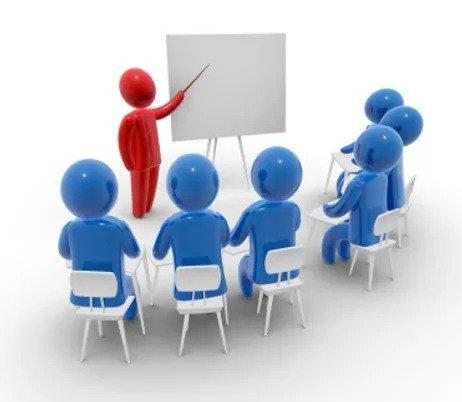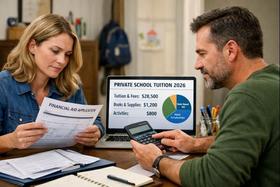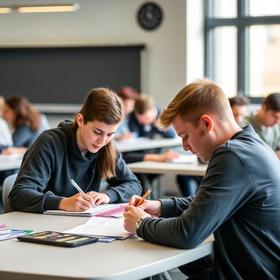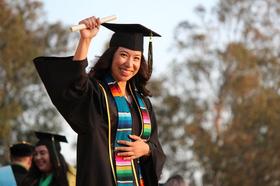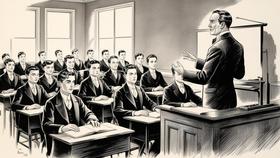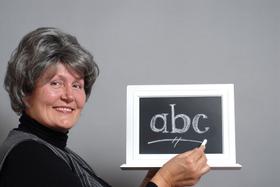Years ago if you wanted to be a private school teacher, you went to college, got a degree in your subject, took a few education courses and began teaching. It's not that easy these days. Most private schools want you to be a trained teacher as well as to have a degree in your subject. But most private schools also want you to be trained to teach the way they want you to teach. After all the teaching is what a private school is all about. The better the teaching, the better the students learn.
The bottom line is that parents send their children to private school for the most part to receive the very best education their money can buy. As a result, employing well-qualified, credentialed faculty is a top priority. This short video clip is one of several clips explaining how to become a private school teacher.
Duties of a private school teacher
Miss Porter's School's description of the duties of a teacher are fairly typical.
"Classroom responsibilities involve four or five courses per academic year and faculty members are expected to contribute to the extra-curricular life of the school and share some dormitory and residential school responsibilities. Qualifications for all teaching positions, therefore, include a demonstrated interest in coaching or coordinating extra-curricular activities and a willingness to fulfill evening and weekend duties.Bachelor's degree required for all faculty positions; Master's preferred."
The important point to note here is that you will do more than simply teach academics. You will be responsible for teaching the whole child. That means you will lead or be involved with an extracurricular activity or club of some sort. This part of your job gives you the opportunity to teach tolerance, team work and persistence to your students. These qualities will be enhanced by your example, participation and leadership. Schools know this. That is why extracurricular activities are part of your duties.
The same thing applies to your participation in athletics. Depending on your background, experience and training, you could end up helping with coaching a team. Once again you are teaching the whole child. Private schools believe wholeheartedly in the concept of mens sana in corpore - a healthy mind in a health body - a concept which traces its roots to the Roman poet Juvenal.
Licensing
At some point in your journey towards becoming a teacher you will encounter licensing requirements. These are intertwined in most states with the Praxis tests written and administered by the Educational Testing Service. Even if your school does not require you to be licensed by the state, earn your license while you are young. It looks good on your resume as it indicates that you have been certified. It is also cheap insurance for those inevitable moves which come with any career nowadays.
If you are a private school graduate, you will occupy a special place on your alma mater's faculty. Alumni who come back as teachers truly know their school and are a strong endorsement for its accomplishments and traditions. They understand the way the school works. They support its mission and objectives.
Good teachers are attracted to private schools because quality teaching is appreciated. Teachers want to teach. They really do not want to push paper and be mired in a swamp of arcane bureaucratic rules and procedures. Furthermore, they do not want to be faced with never-ending disciplinary issues. In a private school teachers can focus on teaching. They want the freedom to be creative and effective teachers.
Education programs
The Penn Residency Master's in Teaching is an innovative program. In their own words:
"A groundbreaking collaboration between the Penn Graduate School of Education and a consortium of the nation’s leading Boarding Schools, the University of Pennsylvania’s Penn Residency Master's in Teaching (PRMT) program enables aspiring teachers to receive a Master’s degree in education while completing teaching fellowships at host schools. With an innovative and comprehensive curriculum designed specifically for the boarding schools’ unique setting, the program features intensive on-site sessions in combination with innovative and collaborative distance learning."
Participating boarding schools include The Deerfield School, The Hotchkiss School, The Lawrenceville School, The Loomis Chafee School, Milton Academy, Miss Porter's School, Northfield Mount Hermon, The Taft School, St. Paul's School.
Internships
Several private schools offer faculty internships. So you will run across enlightened opportunities such as the Kenan-Lewis Internship at Woodberry Forest School in Virginia. Two Kenan-Lewis interns are appointed annually.
Andover offers The Andover Teaching Fellowship Program. "At Andover on a teaching fellowship, the recent college graduate is introduced to teaching in a program of guided work in the classroom, a professional seminar, and exposure to theories and methods of experienced faculty. Obviously, the school seeks applicants who are new to the vocation of teaching."
The Berkeley Carroll School in Brooklyn also has an established associate teachers program in their Lower School (PK-4).
Choate-Rosemary Hall has a similar program. It is a signal opportunity for a college graduate wanting to be a teacher. Even better, it fits in with the plans of people who did a degree in their subject as opposed to an education degree. The young graduate then learns her craft under the careful tutelage and watchful eyes of an experienced mentor. What better way to learn is there than this?
Collegiate School in Richmond has an EE Ford Teaching Fellowship.
Hotchkiss School hires three or four interns a year. "Interns are introduced to the craft of teaching through close work with mentors in their academic disciplines throughout the year, weekly seminars on various aspects of teaching through professional development programs, both on and off campus."
Norwood School in Bethesda offers an internship in conjunction with a degree program at George Washington University. Phillips Exeter Academy offers six to eight one year internships.
Rye Country Day School has several apprentice teaching positions in the Lower School. These are apprenticeship positions providing 1-2 years of classroom experience. The lead teacher serves as a mentor to the assistant, The assistant is expected to pursue a master's degree in conjunction with the classroom experience. There are also a few apprentice teacher positions in the Upper School.
Groton School has had a teaching internship for over forty years. The Charles C. Alexander Teacher-Intern Program is a one year program designed to expose the new teacher to all aspects of the job and the teacher's role in a boarding school community.
Trinity Episcopal School in Austin, Texas offers Teaching Fellow positions in their Lower School. What caught my eye about this program is that their teaching fellows come from a variety of backgrounds including some who have had no formal teaching experience.
"Our teaching fellows are an integral part of our Lower School. They work closely with lead teachers to deliver the strongest education and experience for the students. Our teaching fellows vary in experience and range from first year teachers to teachers with more than ten years of experience. Their backgrounds are diverse and include degrees in education, art history, political science, philosophy, and more. Our teaching fellows have taught literacy, math, art, and special-education in a variety of independent, charter, and public schools. Each year, several fellows come to us with backgrounds outside the field of education."
There are many more internship opportunities out there than I have room to list in this short article. What I have tried to do is to encourage you to explore the opportunities for teaching in a private school. I can assure you personally and professionally that teaching in a private school was the acme me of my several teaching experiences.
Questions? You can contact me @privateschl

